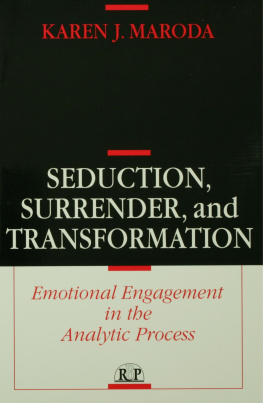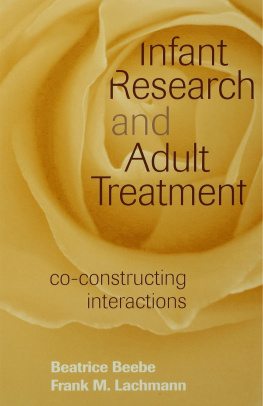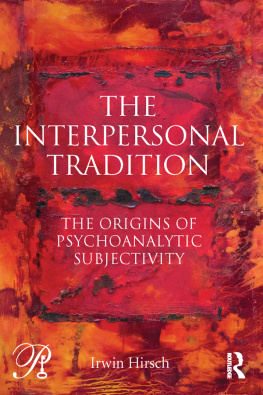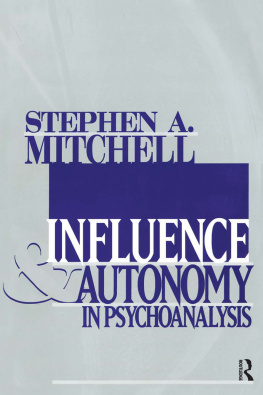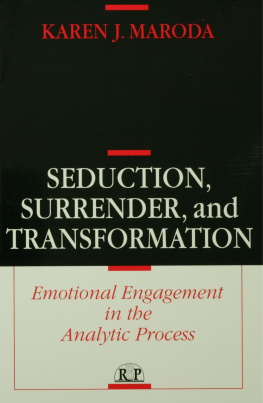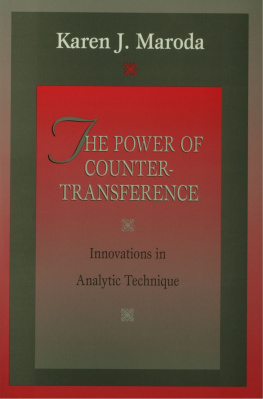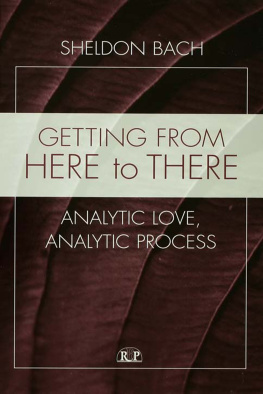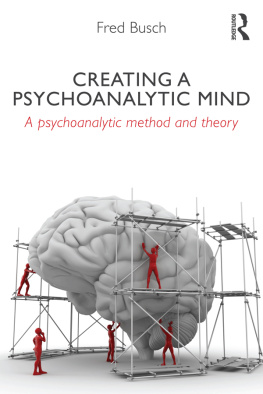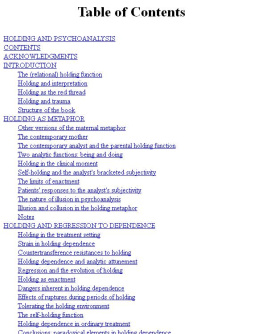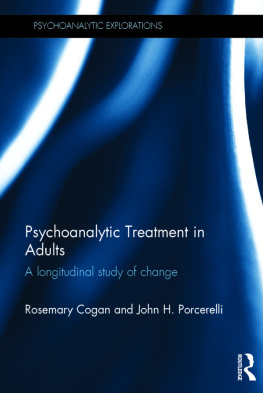Seduction, Surrender, and Transformation
RELATIONAL PERSPECTIVES BOOK SERIES
Volume 13
Relational Perspectives Book Series
S TEPHEN A. M ITCHELL AND L EWIS A RON Series Editors
Volume 1
Rita Wiley McCleary
Conversing with Uncertainty: Practicing Psychotherapy in a Hospital Setting
Volume 2
Charles Spezzano
Affect in Psychoanalysis: A Clinical Synthesis
Volume 3
Neil Altman
The Analyst in the Inner City: Race, Class, and Culture Through a Psychoanalytic Lens
Volume 4
Lewis Aron
A Meeting of Minds: Mutuality in Psychoanalysis
Volume 5
Joyce A. Slochower
Holding and Psychoanalysis: A Relational Perspective
Volume 6
Barbara Gerson, editor
The Therapist as a Person: Life Crises, Life Choices, Life Experiences, and Their Effects on Treatment
Volume 7
Charles Spezzano and Gerald J. Gargiulo, editors
Soul on the Couch: Spirituality, Religion, and Morality in Contemporary Psychoanalysis
Volume 8
Donnel B. Stern
Unformulated Experience: From Dissociation to Imagination in Psychoanalysis
Volume 9
Stephen A. Mitchell
Influence and Autonomy in Psychoanalysis
Volume 10
Neil J. Skolnick and David E. Scharff, editors
Fairbairn, Then and Now
Volume 11
Stuart A. Pizer
Building Bridges: Negotiation of Paradox in Psychoanalysis
Volume 12
Lewis Aron and Frances Sommer Anderson, editors
Relational Perspectives on the Body
Volume 13
Karen J. Maroda
Seduction, Surrender, and Transformation: Emotional Engagement in the Analytic Process
In Preparation
Emmanuel Ghent
Process and Paradox
James S. Grotstein
Psychic Presences
Rochelle G. K. Kainer
The Collapse of the Self and Its Therapeutic Restoration
Stephen A. Mitchell and Lewis Aron, editors
Relational Psychoanalysis: The Emergence of a Tradition
Seduction, Surrender, and Transformation
Emotional Engagement in the Analytic Process
Karen J. Maroda
1998 by The Analytic Press, Inc., Publishers
First paperback printing 2002.
All rights reserved. No part of this book may be reproduced in any form: by photostat, microform, retrieval system, or any other means, without the prior written permission of the publisher.
Published by The Analytic Press, Inc.
101 West Street, Hillsdale, NJ 07642
www.analyticpress.com
Typeset by in Goudy Old Style 11/13 by Qualifax, Bloomfield, NJ
Index by Leonard Rosenbaum, Washington, DC
Library of Congress Cataloguing-in-Publication Data
Maroda, Karen J.
Seduction, surrender, and transformation: emotional engagement in the analytic process / Karen J. Maroda
p. cm.
Includes bibliographical references and index.
ISBN 0-88163-397-6
1. Psychotherapist and patient. 2. Psychoanalysis. I. Title.
RC480.8M37 2002
616..89'17dc21
for Library of Congress
98-50500
CIP
Printed in the United States of America
10 9 8 7 6 5 4 3
Contents
To my parents, Jean and Frank Maroda
I want to thank Lew Aron for his tremendously generous support, which includes the invitation to participate in the Relational Book Series, and his careful reading and critiquing of the first draft of this manuscript. I am also thankful for his ongoing collegial encouragement and his appreciation for my ideas and ambitions. Lew Aron is that rare individual who views his colleagues not as competitors, but as collaborators in the advancement of psychoanalytic theory and practice. I also want to thank Stephen Mitchell, co-editor of this series, who has supported my work over the past few years, particularly in encouraging me to listen to my own voice, even if it strayed from the politically correct.
Practicing in Milwaukee does not provide me with many analytic colleagues and I greatly value my national support network, which includes not only Lew and Steve, but also the women of Section III, Women, Gender & Psychoanalysis, who invited me to join the board several years ago and whose members have offered their ongoing friendship, collaboration, and enthusiasm. It's nice to know that even when you have the misfortune of speaking at the same time as a star-studded panel of internationally-known analysts, there will always be some familiar faces in the audience.
I also want to thank Joe Reppen, who has probably done more to further my career than anyone else. Since inviting me to contribute to Psychoanalytic Books many years ago, I have done countless reviews in that journal, and have been offered opportunities to write as a result of Joe's faith in both my ideas and my ability to communicate them. He is always there for me, ready to discuss any idea or potential project, always with an openness and intellectual virtuosity that are invaluable to me.
It goes without saying that I am grateful to my patients for continuing to educate me about the therapeutic process and myself. I want particularly to thank the patients referred to in this book, especially "Susan," who gave me permission to write about them and who read and critiqued what I wrote, letting me know when I had missed the mark.
Lastly, I want to thank my partner, Nicole Horvath, for endless hours of listening to my ideas for this book and for her many creative contributions to my thinking, including the question from chapter one that she posed to me: Does psychoanalysis exist without the bad mother? She has inspired me to break out of my established ways of looking at things, constantly challenging me to see the world in new and different ways.
The reconceptualization of the psychoanalytic situation as a two-person event has caused dramatic upheaval in the analytic world. As we struggle to understand the many nuances associated with the transition from a one-person psychology to a two-person psychology, we naturally resist change as much as we embrace it.
The refrain of "This is nothing newpsychoanalysis has always accounted ably for both the intrapsychic and the interpersonal" has become a recognizably feeble attempt to maintain the status quo. Historically, the same was said about developments in self-psychology, infant research, feminist perspectives, the frequency and impact of early trauma, and the critical importance of countertransference.
Happily, those who want to cling to the past and keep psychoanalysis the same are in the minority. The clinical experience and research evidence accumulated over the past fifty years have given birth to new theories of individual development and, as a result, a new theory of psychoanalysis. And this new understanding of the role of mutuality has breathed fresh air and excitement into an analytic discipline moving dangerously close to extinction.
The problem confronting analytic theorists and clinicians today is not whether to change analytic theory and practice, but how to change them. For many years we have attempted to integrate new discoveries, particularly pertaining to countertransference and mutuality, within the existing analytic paradigm. The goal of treatment remained similar to that expressed by Freud over seventy years ago: making the unconscious conscious, and diminishing or eliminating the transference. And the main technical device used to achieve this goal was said to be interpretation.
As I pointed out previously (), as new discoveries were made there were years of vain attempts to ward off any threat to the analytic status quo. Everything began to be packaged and re-packaged as a "form of interpretation," until we finally admitted that we could no longer stuff the rounded repertoire of confrontation, questioning, emoting, empathizing and silence into the rather squared-off realm of interpretation. To my mind, it was a great relief when people started admitting, in print, that while the ultimate goal of analysis remained centered on self-awareness and integration, we were not limited to interpretation as the primary clinical tool for facilitating self-knowledge.

